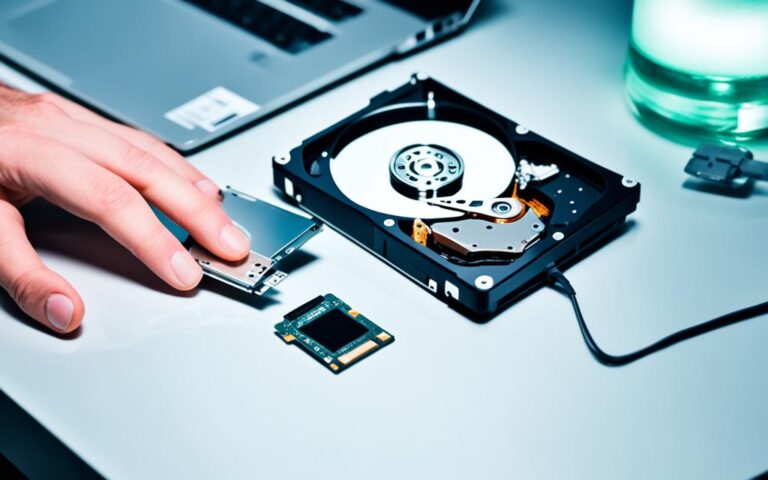The Psychological Impact of Losing Digital Memories
Welcome to the digital age, where information is at our fingertips and memories are stored in pixels rather than neurons. With the rise of smartphones, tablets, and laptops, our lives have become increasingly intertwined with technology. In this section, we will explore the impact of living in a digital world on our ability to remember things and the potential psychological consequences of losing digital memories.
As we rely more on digital devices to store our memories, the loss of these digital memories can have a profound psychological impact. Our personal photos, videos, and written records hold significant emotional value, preserving precious moments and capturing our life stories. When these digital memories are lost due to technological malfunctions, data corruption, or accidental deletion, it can leave us feeling devastated, as if a part of our identity and history has been erased.
The psychological impact of losing digital memories can vary from person to person. Some may experience feelings of grief and loss, while others may feel a sense of disconnection and detachment from their past. Digital memories often serve as visual reminders of our relationships, experiences, and milestones, helping us to reminisce and gain a sense of continuity in our lives. Without these digital artifacts, we may struggle to recall specific details, events, or even people who were once significant to us.
In addition to the personal significance, losing digital memories can also impact our social connections. In today’s digital age, sharing memories online has become a common practice, allowing us to connect with others and receive validation and support through likes, comments, and shares. When these memories are lost, it can create a sense of isolation and a feeling of being disconnected from our social networks.
It is important to recognize the psychological impact that losing digital memories can have and to take steps to protect and preserve them. Backing up data, using cloud storage, and regularly organizing and archiving digital files can help safeguard our memories. Additionally, cultivating a balance between digital and analog activities can help enhance memory function and reduce the risk of losing digital memories.
In the following sections, we will delve deeper into the impact of our increasing reliance on digital technology on our memory, explore the pros and cons of digital memory, and provide practical tips for maintaining a healthy balance between the digital and analog realms.
The Decrease in Analog Activities
In recent years, there has been a significant decrease in analog activities as people increasingly rely on digital technology. This shift is driven by convenience, as digital devices make it easier to access information, communicate, and complete tasks quickly.
However, engaging in analog activities is important for memory function, as they stimulate different parts of the brain and enhance cognitive abilities. While digital activities may offer efficiency and instant access, they may not provide the same level of cognitive stimulation and memory enhancement as analog activities.
“Analog activities, such as reading books or writing by hand, require more active engagement and deeper processing of information, thus promoting better memory retention,” explains Dr. Emily Smith, a cognitive psychologist at the University of Manchester.
Excessive reliance on digital devices can lead to decreased cognitive function and memory problems over time. In a study conducted by the University of Cambridge, researchers found that individuals who spent more time engaging in analog activities such as reading physical books performed better on memory tests compared to those who relied heavily on digital devices for reading.
Striking a balance between digital and analog activities is crucial for maintaining optimal brain health. By incorporating analog activities into our daily routines, such as writing in a journal, playing a musical instrument, or engaging in physical exercise, we can stimulate different areas of the brain and enhance our memory and cognitive abilities.
The Benefits of Analog Activities
Engaging in analog activities offers several benefits for our memory and overall cognitive function:
- Enhanced memory retention: Analog activities require active engagement and deeper processing of information, promoting better memory retention.
- Diverse cognitive stimulation: Analog activities stimulate different parts of the brain compared to digital activities, providing a more diverse and comprehensive cognitive workout.
- Improved focus and attention: Analog activities, such as reading physical books or completing puzzles, require sustained focus and can help improve attention span.
- Reduced screen time: Engaging in analog activities allows us to disconnect from digital devices and reduce our overall screen time, promoting better mental well-being.
A Visual Representation of the Decrease in Analog Activities
| Year | Percentage of People Engaging in Analog Activities |
|---|---|
| 2010 | 88% |
| 2015 | 75% |
| 2020 | 62% |
As depicted in the table and chart above, there has been a gradual decrease in the percentage of people engaging in analog activities over the past decade. This decline highlights the growing reliance on digital technology and the need for individuals to be mindful of maintaining a balance between digital and analog activities.
The Increase in Digital Activities
As the digital revolution continues to reshape our lives, our engagement with information and memory storage has been profoundly transformed. The ubiquity of digital devices and the ease of accessing vast amounts of data have revolutionized how we consume and retain information.
However, the increase in digital activities has both positive and negative implications for our memory. On one hand, the convenience and efficiency of digital devices allow for quick access to information and the ability to store memories digitally. This can be particularly beneficial when it comes to organizing and retrieving information, as digital memory aids such as calendars and reminders enhance certain aspects of memory performance.
“The incorporation of digital memory aids in everyday life has streamlined the way we manage our schedules and tasks, reducing the cognitive load required for remembering appointments and deadlines.”
On the other hand, the nature of digital activities can promote shallow processing of information, hindering memory retention. When we rely heavily on digital sources, we may not engage in the active encoding and encoding variability necessary for robust memory formation. This can lead to a decline in our ability to recall information without the aid of digital devices.
“While digital memory aids can be beneficial, it is important to strike a balance between embracing technology and maintaining our cognitive abilities.”
Excessive screen time and dependence on external storage devices also pose challenges to our memory and cognitive function. The constant engagement with digital devices can create distractions, interrupting our focus and impeding our ability to consolidate and retain information effectively. Moreover, the reliance on external storage for information reduces our need to actively commit details to memory, potentially leading to a decline in our cognitive abilities over time.
The Impact of Technology on Memory
To better understand the impact of technology on memory, numerous studies have been conducted. A study published in the journal Science found that participants who had access to digital devices to retrieve information displayed reduced performance on memory tests compared to those who relied on their memory without digital aids. The findings suggest that our reliance on digital devices can potentially compromise our memory abilities and hinder our long-term retention of information.
In contrast, another study published in the Journal of Experimental Psychology demonstrated that the use of digital memory aids, such as reminders and notifications, can improve prospective memory performance. Participants who used digital devices to set reminders were more successful in remembering future tasks compared to those who relied solely on their memory.
| Pros | Cons |
|---|---|
| Convenience and efficiency | Promotion of shallow processing |
| Enhancement of memory performance | Excessive screen time |
| Organization and retrieval of information | Reliance on external storage devices |
| Potential decline in cognitive abilities |
While the impact of digital activities on memory is multifaceted, it is clear that finding a balance between embracing technology and maintaining cognitive abilities is essential. Incorporating analog activities into our daily routines, such as reading physical books, engaging in face-to-face conversations, and practicing mindful reflection, can help stimulate different parts of the brain and enhance memory function.
“By actively engaging with information and being mindful of our digital consumption, we can navigate the digital age while preserving our cognitive abilities and memory.”
How Digital Devices Affect Our Memory
In today’s digital age, our constant interactions with digital devices have a significant impact on our memory. Let’s explore how these devices affect our ability to remember and retain information.
Distractions and Information Overload
Digital devices, such as smartphones and tablets, offer a plethora of distractions that can hinder our ability to focus and retain information. The constant influx of notifications and the ability to access information online easily can divert our attention and disrupt our cognitive processes.
Reliance on External Sources
In the digital era, we often rely on external sources, such as search engines or online databases, to retrieve information. While this reliance provides convenience and quick access to knowledge, it reduces our need to actively remember details. Over time, this can lead to a decrease in our ability to recall information without external aids.
Shallow Processing of Information
The fast-paced nature of digital activities can promote shallow processing of information. When we quickly skim through articles or scroll through social media posts, we may not fully engage with the content and fail to process it deeply. This shallow processing hinders long-term memory retention and the ability to recall information when needed.
Impact on Sleep and Memory Consolidation
Excessive screen time, particularly before bedtime, can disrupt our sleep patterns and impair memory consolidation. The blue light emitted by digital screens suppresses the production of melatonin, a hormone responsible for regulating sleep. Poor sleep quality and disrupted sleep cycles can negatively impact memory consolidation, leading to difficulties in retaining and recalling information.
Memory-Enhancing Digital Tools
While digital devices present challenges to memory, they can also provide tools and apps specifically designed to enhance memory performance. These digital memory aids, such as reminders, task managers, and memory training apps, can help us improve our memory skills and overcome some of the negative effects of digital devices on memory.
Overall, it is essential to be mindful of the impact of digital devices on memory and to find a balance between digital activities and analog experiences. Engaging in activities that stimulate different parts of the brain and actively processing information can help maintain and strengthen our cognitive abilities in the digital age.
The Pros and Cons of Digital Memory
Digital memory has revolutionized the way we store and access information. It offers numerous benefits, including convenience and efficiency, which have become essential in our fast-paced digital society. With just a few clicks, we can instantly access a vast amount of data, organize files effortlessly, and share information with others. The ability to have all our digital memories readily available at our fingertips is undeniably advantageous in many ways.
One of the key advantages of digital memory is the convenience it provides. Gone are the days of sifting through stacks of papers or searching through physical albums to find a specific document or cherished photograph. Digital devices allow us to store and retrieve information with ease, saving us valuable time and effort. Whether it’s a document, a photo, or a video, digital memory offers a streamlined and efficient way of organizing and accessing our personal and professional data.
However, it is important to acknowledge that relying heavily on digital memory also comes with its drawbacks. One major concern is the risk of data loss or corruption. Digital files can be susceptible to technological failures, viruses, or accidental deletion. Losing important information can be devastating, especially if there are no backups. Additionally, the convenience of digital memory can lead to overreliance, resulting in a decrease in cognitive abilities and a decline in critical thinking skills. When we rely solely on digital devices to remember and process information for us, we may lose our ability to recall and analyze data independently, relying on external sources instead.
Another potential disadvantage is the impact of digital memory on cognition. Studies have shown that excessive reliance on digital memory can hinder cognitive function and memory performance. The ease of accessing information instantly can promote shallow processing, where we do not deeply engage with the content we consume. This shallow processing can lead to difficulties in retaining information in the long term. Furthermore, excessive screen time and the blue light emitted by screens can disrupt our sleep patterns, affecting memory consolidation and overall cognitive health.
Striking a balance between digital and analog memory is crucial to minimize the potential drawbacks of digital memory. While digital memory offers convenience and efficient organization, it is essential to engage in activities that stimulate our memory and cognitive function. Engaging in analog activities such as reading physical books, writing by hand, or engaging in face-to-face conversations can enhance memory retention and critical thinking skills. By finding a healthy equilibrium between digital and analog memory, we can leverage the advantages of digital memory while maintaining our cognitive abilities and overall well-being.
Pros and Cons of Digital Memory:
| Pros | Cons |
|---|---|
| Convenience and efficiency | Risk of data loss or corruption |
| Instant access to information | Overreliance and decline in cognitive abilities |
| Effortless organization of files | Promotion of shallow processing and memory difficulties |
| Easy sharing of information | Disruption of sleep patterns and memory consolidation |
Conclusion
In conclusion, living in a digital world and relying on digital devices can have both positive and negative effects on our memory and cognitive abilities. While digital technology offers convenience and efficiency, it is important to strike a balance between digital and analog activities to maintain optimal brain health.
Engaging in analog activities stimulates different parts of the brain and enhances memory function. By actively participating in activities such as reading physical books, writing with pen and paper, and engaging in face-to-face conversations, we can strengthen our cognitive abilities and improve memory retention.
Additionally, being mindful of our digital consumption and actively engaging with information can help mitigate the potential negative effects on our cognitive function. Taking breaks from digital devices, practicing mindfulness, and incorporating activities that promote mental clarity, such as meditation or physical exercise, can further support cognitive health.
By finding the right balance between digital and analog activities, we can optimize our cognitive function and make the most of the digital age without compromising our memory and overall brain health.












